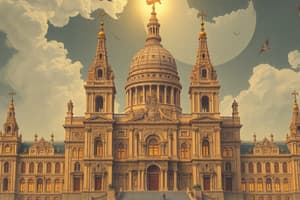Podcast
Questions and Answers
What characterizes an absolute monarchy?
What characterizes an absolute monarchy?
- Voters are denied participation. (correct)
- Political parties have significant influence.
- Judiciary operates independently of the monarchy.
- Voters are actively involved in decision making.
Which type of democracy allows citizens to directly participate in law-making?
Which type of democracy allows citizens to directly participate in law-making?
- Military dictatorship
- Representative democracy
- Direct democracy (correct)
- Indirect democracy
Which government type is characterized by a lack of political freedoms?
Which government type is characterized by a lack of political freedoms?
- Communist government (correct)
- Constitutional monarchy
- Democratic republic
- Military dictatorship
What does the term 'adult franchise' refer to?
What does the term 'adult franchise' refer to?
What role do legislative bodies play in governance?
What role do legislative bodies play in governance?
Flashcards are hidden until you start studying
Study Notes
Contemporary Period
- Marked the beginning of a new political landscape after World War II in 1945.
Types of Governments
- Absolute Monarchy: Voters are denied the right to participate; judiciary has little independence.
- Constitutional Monarchy: Sovereign power is limited by a constitution, ensuring government accountability.
- Dictatorship: Characterized by total control of power, exemplified by Adolf Hitler and Benito Mussolini.
- Military Dictatorship: Governed by military authorities; often restricts freedoms and imposes strict control, as seen in Pakistan.
- Communist Government: Lacks political freedom, operates with a single party system; notable examples include China, North Korea, and Cuba.
Potentiality
- Refers to the capacity for leadership, emphasizing concepts of liberty and independence.
Types of Democracy
- Direct Democracy: Citizens directly participate in decision-making and legislation; most effective in small populations, as in Switzerland.
- Indirect Democracy (Representative Democracy): Citizens elect representatives to make decisions on their behalf.
Types of Government Bodies
- Legislative Body: Comprises elected officials, such as the President and the two houses of Parliament – Lok Sabha and Rajya Sabha.
- Consent Agreement: An understanding where individuals give their approval for governance.
- Adult Franchise: The right of all adult citizens to vote in elections, promoting democratic participation.
- Dignity in Voting: Acknowledges the respect and importance associated with the individual vote.
Studying That Suits You
Use AI to generate personalized quizzes and flashcards to suit your learning preferences.




